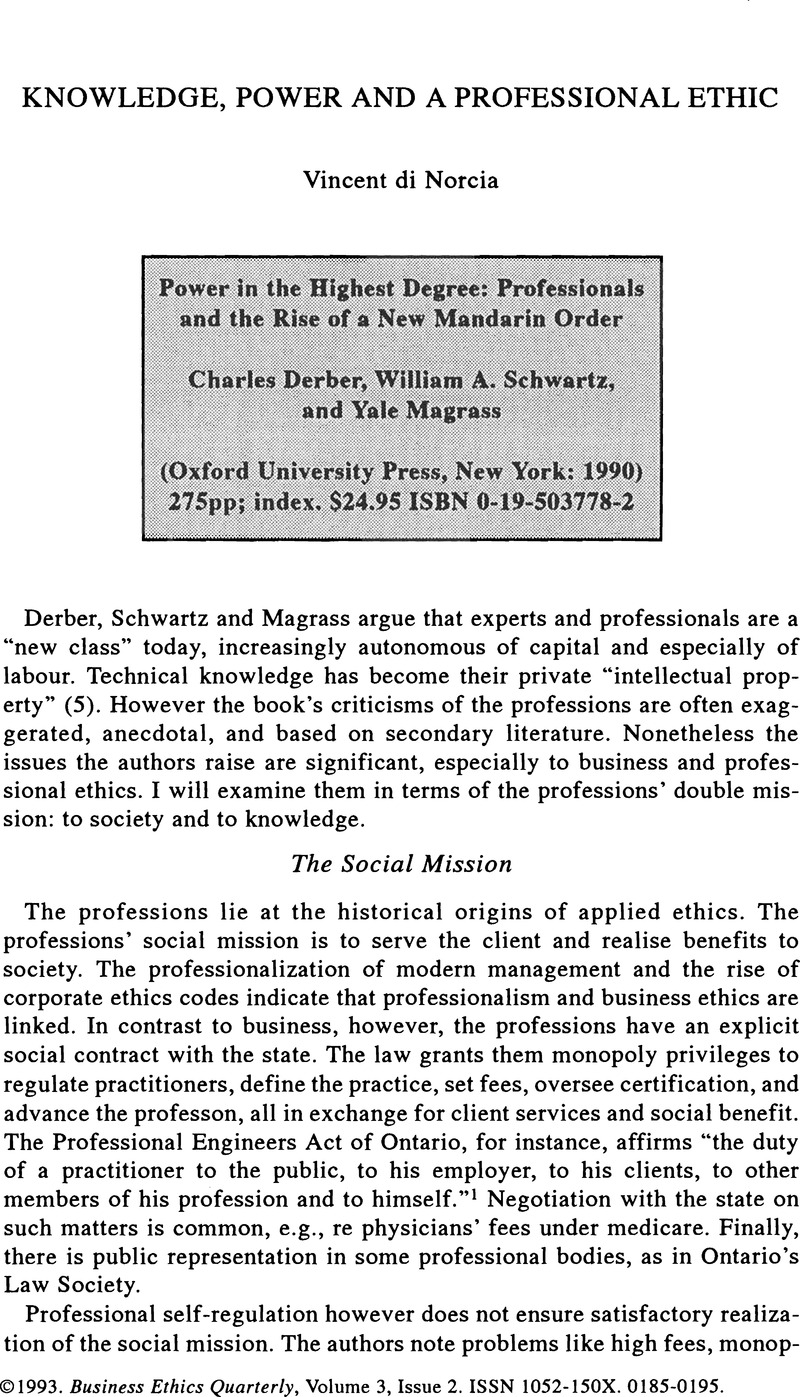Article contents
Knowledge, Power and a Professional Ethic
Published online by Cambridge University Press: 23 January 2015
Abstract

- Type
- Review Articles
- Information
- Copyright
- Copyright © Society for Business Ethics 1993
References
Notes
1 This is clear for instance in the legally grounded codes governing engineering in Canada; see Morrison, C. and Hughes, P., Professional Engineering Practice: Ethical Aspects. Second edition (McGraw-Hill Ryerson, Toronto: 1988), 158.Google Scholar.
2 See Kenneth, Boulding, and Amitai, Etzioni, The Moral Dimension (Free Press, NY: 1988)Google Scholar for a more realistic social model of economics. See Aristotle, Dewey and Kropotkin for a more empirical view of ethics, Mutual Aid and Ethics (Blom, NY: 1964 and 1968)Google Scholar; and John, Wilson’s, On Human Nature (Bantam, NY: 1979)Google Scholar, ch. 7 on cooperation, egoism and altruism. Not to mention Buber’s I and Thou. See J. J. Rousseau, Emile Part IV; Discourse on Inequality, note O and Hirschman, A. O., The Passions and the Interests (Princeton University Press, Princeton: 1977), 109fGoogle Scholar.
3 Cf Charles, Perrow, Normal Accidents (Basic, NY: 1984)Google Scholar and Meehan, R., The Atom and the Fault (MIT Press, Cambridge: 1984)Google Scholar.
4 Power/Knowledge: Selected Interviews and Other Writings, Gordon, C., ed. (Pantheon, NY: 1980), 82Google Scholar; but the authors ignore Foucaulťs extended treatment of these ideas in Discipline and Punish (Random House, NY: 1979). It is a study of a decidedly pre-professional 18th century.
5 See John, Burke, “Bursting Boilers and the Federal Power,” in Technology and Culture, Kranzberg, M. and Davenport, W. H. eds. (New American, NY: 1972), 93–120Google Scholar; and Perrow, chs. 5, 6.
6 See Layton, E., The Revolt of the Engineers (Johns Hopkins University Press, Baltimore: 1986), ch. 3; and Perrow, 179–88, 339–40Google Scholar.
7 However many Marxists are bourgeois intellectuals; see 184. The authors cite a column from their local daily, The Boston Globe on yuppie versus ‘traditional’ values (155). They refer to the Globe 4 times—more than Business Week (3), Scientific American (3) and the NY Times (1). No foreign newspaper is cited.
8 See chapters 10, 11, 14, 16, 17. The authors’ approach is neo-Marxist. It focusses on economics and ignores other social forces, ones which business and ethics must recognize: e.g., technology, environmentalism, feminism and national culture. See Hazel, Henderson, The Politics of the Solar Age (Knowledge Systems, Indianapolis: 1988)Google Scholar; Ursula, Franklin, The Real World of Technology (CBC, Toronto: 1990)Google Scholar, and Antony, Smith, Theories of Nationalism (Duckworth, London: 1971)Google Scholar.
9 A student of Veblen’s. See his Empire & Communications (University of Toronto, Toronto: 1972), to which the authors do not refer. Innis criticized Marx on communications grounds and was the source of McLuhan’s theories. See the latter’s preface to Innis” Bias of Communications (University of Toronto, Toronto: 1964). Also Vincent di Norcia, “Communications, Time and Power: an Innisian View” Can. J. of Political Science (XXIII:2; June, 1990), 352-55.
10 They cite the Heisenberg uncertainty principle in quantum mechanics in support, but this theorem has no proven role in other sciences. The well-known interpretive problems inthe human sciences are different in cause and kind, as the authors’ critique of positivism implies.
11 Like a dichotomy between knower and known or the copy/correspondence theory of truth. Nor are interpretation and facticity opposed; or paradigms and theory. While some experts may reify ideas into things, e.g., ‘IQ’ as a stand-in for intelligence and mathematical models for markets (37), this also applies to the book’s fetish of class theory.
12 See Arthur, Francis, New Technology at Work (Oxford UP, Oxford: 1986) 76–8Google Scholar.
13 See Habermas, , Knowledge and Human Interests (Beacon, Boston: 1971)Google Scholar for a fuller theory of the sciences and values: and Adorno, and Horkheimer’s, Dialectic of Enlightenment (Lane, London: 1973)Google Scholar for a more telling philosophic critique of positivism and rationalism than the authors offer. Like Habermas I reject the positivist reduction of values to arbitrary personal, private, or class judgments making choice idiosyncratic and untestable (see 43).
14 55. David, Schon, The Reflective Practitioner (Basic, NY: 1983)Google Scholar. The authors merely cite Schon and pass on to other topics.
- 2
- Cited by


